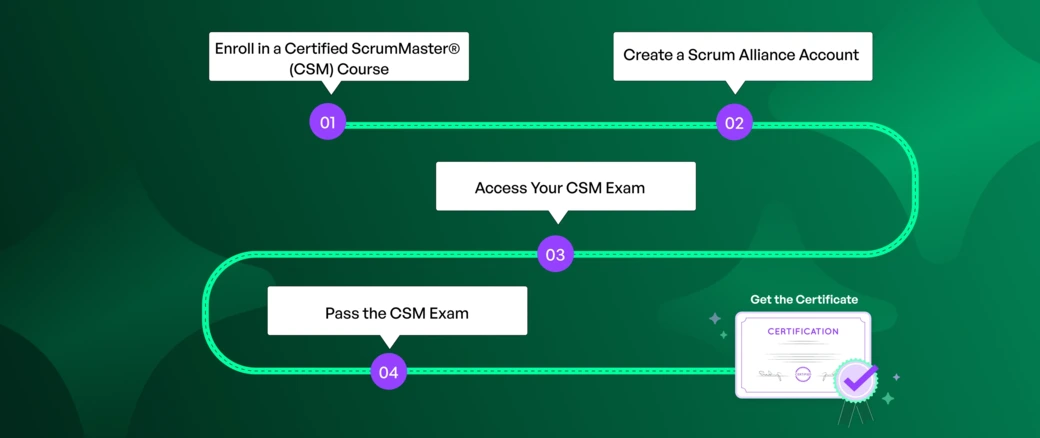How to get the CSM certification
To get a Certified ScrumMaster certification, you must take a 2-day training course approved by the Scrum Alliance from a Certified Scrum Trainer. You will learn about Scrum principles, roles, and practices during the course. After completing the training, you will take an online exam with multiple-choice questions. Once you pass, accept the Scrum Alliance license agreement and get the Certified ScrumMaster certification.
CSM Certification Validity Period
The CSM (Certified ScrumMaster) certification is one of the most recognized credentials in the Agile and Scrum community. The CSM certification is valid for two years from the date you pass the CSM exam.
After two years, you must renew your certification to maintain its validity and continue using the CSM title.
Key Details for CSM Validity:
- Duration: Valid for 2 years starting from the certification date or the most recent renewal.
- Renewal Requirement: Accumulate 20 Scrum Education Units (SEUs).
- Renewal Fee: A fee of $100 covers the two-year renewal cycle.
- SEU Earning: SEUs can be earned through relevant learning activities such as reading, attending webinars, or participating in agile events (1 hour of activity = 1 SEU).
- Grace Period: A 30-day grace period is provided after expiration, though late fees may be charged if renewal is not completed in time.
- Renewal Process: You need to log in to the Scrum Alliance website to submit your SEUs and pay the renewal fee.
Why Does the CSM Certification Expire?
A Certified ScrumMaster (CSM) certification needs renewal every two years to maintain professionalism in ever-changing Scrum best practices. The continuous improvement of Scrum and renewal supports practitioners in staying current with industry guidelines through ongoing learning experiences. Certified Scrum Masters must earn Scrum Education Units (SEUs) to renew their certification and pay a renewal fee, keeping them knowledgeable and effective within Agile workplaces.
How to Renew Your CSM Certification Before it Get Expired?
You can renew your CSM certification in two ways. One is that you can enroll in any other certification course from the Scrum Alliance, and the second option is to earn 20 SEUs within two years of renewing your certification.
Renew your CSM certification following the steps given below:
1. Earn Scrum Education Units (SEUs):
You need to earn 20 SEUs within two years.
SEUs can be earned by participating in Scrum-related activities such as:
Attending Scrum/Agile workshops, webinars, or conferences, as well as understanding essential aspects like Estimation in Scrum, can help you earn SEUs and stay updated with current Scrum methods.
Taking additional Scrum or Agile training courses.
Writing blogs, articles, or books on Scrum/Agile topics.
Volunteering in the Agile community or mentoring others.
2. Pay the Renewal fee:
- You can pay the renewal fee of $100 through the Scrum Alliance website.
What Happens If You Don’t Renew?
If you fail to renew your CSM certification within the two years:
Your certification will expire, and you will no longer be recognized as a Certified ScrumMaster.
You will lose access to the Scrum Alliance member benefits.
To regain the certification, you must take the CSM course and pass the exam again.
Also Read: CSM Certification Duration
Benefits of Renewing Your CSM Certification
Stay Relevant: Your active renewal checks help you learn about present Scrum methods and industry patterns.
Career Growth: To boost your role as a valuable Agile candidate in the job market, an active CSM certification helps build trust with hiring organizations.
Access to Resources: Scrum Alliance members benefit from dedicated resources alongside networking possibilities and community-based gatherings.
Global Recognition: CSM certification is recognized worldwide; thus, maintaining its active status demonstrates the consistent pursuit of knowledge expansion.
Renewing your CSM certification not only keeps your knowledge fresh but also encourages continuous learning of newer frameworks and methods like the Zero Sprint in Agile, which can play a key role during project initiation.
Also Read: How are Scrum Masters Driving AI in USA Industries?
Key Timelines to Remember
- Validity Period: Your certification remains active for 24 months from the date you successfully passed the exam.
- Renewal Window: You are eligible to begin the renewal process up to 6 months prior to your certification's expiration date.
- Grace Period: In the event that your certification expires, you can typically still renew it by submitting the required SEUs and paying the applicable fee. However, you are not permitted to represent yourself as "Certified" while your certification is in an expired or inactive state.
- Retake Rule: If you let your certification lapse for a prolonged duration (generally beyond 1 year), the Scrum Alliance may mandate that you retake the course and exam in order to reinstate your certification status.
Tips for Earning SEUs
Plan and track your SEUs using the Scrum Alliance dashboard.
Participate in free or paid Agile/Scrum events, webinars, and workshops.
Engage with the Agile community by sharing knowledge or volunteering.
Conclusion:
The CSM certification is valid for two years, after which you must renew it by earning 20 SEUs and paying a $100 renewal fee. Renewing your certification ensures you stay current with Scrum practices and maintain your professional standing in the Agile community. Keeping your CSM certification active is highly recommended if you are serious about a Scrum and Agile project management career. and also know about the CSM Certification Study Guide.







 The Scrum Alliance provides the globally recognized Certified Scrum Master certification.
The Scrum Alliance provides the globally recognized Certified Scrum Master certification. 






